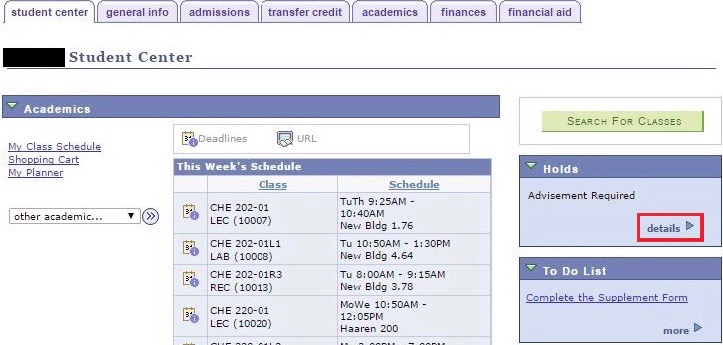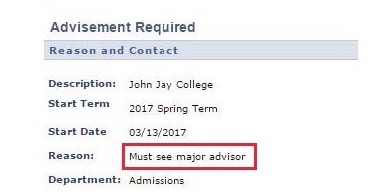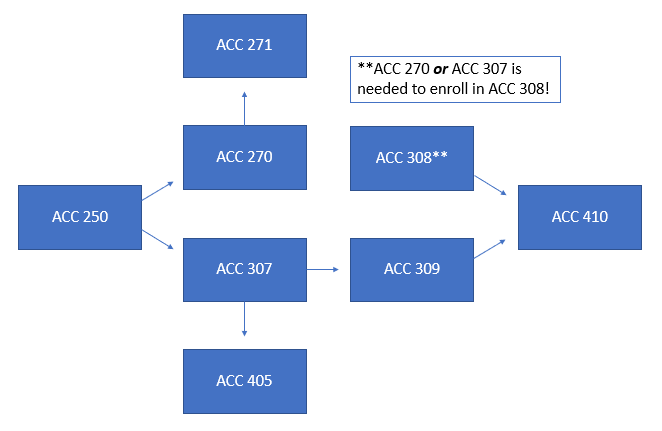Fraud Examination & Financial Forensics Major Resources
Here you will find:
- Key information about your major
- How and when to meet with your major advisor
- Planning tools that will help you track your progress in the major
- Ways to explore career opportunities related to the FEFF major
Take a few moments to look at the information below. It will help you plan effectively and avoid surprises during your studies at John Jay. Please visit the Department of Public Management website for information, resources, and opportunities!
FEFF Requirements
You are responsible for the major requirements that were in effect when you declared the major. To confirm the requirements you should be following, go to the Undergraduate Bulletin for that academic year. For example, if you declared the FEFF major in Fall 2015 or Spring 2016, you would click on the 2015-2016 Undergraduate Bulletin. If you declared the major and then left the College for more than one full semester, you’re responsible for the major requirements in effect when you return, if they have changed. Not sure when you declared the major? Find out here.
Below, find the Undergraduate Bulletin that was in effect when you declared the major.
- 2024-2025 Undergraduate Bulletin - FEFF
- 2023-2024 Undergraduate Bulletin - FEFF
- 2022-2023 Undergraduate Bulletin - FEFF
- 2021-2022 Undergraduate Bulletin - FEFF
- 2020-2021 Undergraduate Bulletin - FEFF
- 2019-2020 Undergraduate Bulletin - FEFF
- 2018-2019 Undergraduate Bulletin - FEFF
- 2017-2018 Undergraduate Bulletin - FEFF
- 2016-2017 Undergraduate Bulletin - FEFF
- 2015-2016 Undergraduate Bulletin - FEFF
- 2014-2015 Undergraduate Bulletin - FEFF
Major Advising
As a freshman, you must meet with a General Academic Advisor, who can get you started with the FEFF major requirements and clarify general education requirements. For more information, visit the Freshman Advisement page.
As a transfer student, once your credits have been evaluated you should first consult with a General Academic Advisor to discuss General Education Requirements. It is important to understand which General Education requirements are satisfied by your transfer credits and which are still outstanding. Head to Navigate (use CUNYfirst user name and password) to make an appointment with a General Academic Advisor.
After talking with a General Academic Advisor, make an appointment with FEFF major advisor Yvonne Purdie. During this appointment, you will discuss which major requirements you have satisfied and what you still need to complete. This is particularly important if you have transferred to John Jay with accounting credits.
Most FEFF major advising is being done remotely in the Fall 2024 semester. You may email Yvonne Purdie using your John Jay email address at ypurdie@jjay.cuny.edu with questions or to set up a Zoom Appointment. Please include your Empl ID number. In-person advising can be done by special arrangement. Yvonne Purdie will not be available by phone. Major advising hours are Monday-Thursday, 9-5. Other days and times by special arrangement.
Be sure to make an appointment with FEFF major advisor Yvonne Purdie to discuss major requirements, learn about opportunities in the major, and do smart planning.
Most FEFF major advising is being done remotely in the Fall 2024 semester. You may email Yvonne Purdie using your John Jay email address at ypurdie@jjay.cuny.edu with questions or to set up a Zoom Appointment. Please include your Empl ID number. In-person advising can be done by special arrangement. Yvonne Purdie will not be available by phone. Major advising hours are Monday-Thursday, 9-5. Other days and times by special arrangement.
As a continuing student, you are encouraged to make an appointment at any stage in your academic careers to discuss planning or address any questions about the major. Yvonne Purdie is available year round, so please feel free to make an appointment at any time of the year.
Most FEFF major advising is being done remotely in the Fall 2024 semester. You may email Yvonne Purdie using your John Jay email address at ypurdie@jjay.cuny.edu with questions or to set up a Zoom Appointment. Please include your Empl ID number. In-person advising can be done by special arrangement. Yvonne Purdie will not be available by phone. Major advising hours are Monday-Thursday, 9-5. Other days and times by special arrangement.
In both fall and spring terms, a major hold will normally be placed on registration for students who have earned between 45 and 59 credits. This happens a couple weeks before registration so that you consult with your major advisor before enrolling in future courses. This to make sure you are clear about requirements and how to make progress in the major.
If you have a hold, make an appointment with Yvonne Purdie. Most FEFF major advising is now being done remotely. You may email Yvonne Purdie using your John Jay email address at ypurdie@jjay.cuny.edu with questions or to set up a Zoom Appointment. In-person advising can be done by special arrangement. Please include your Empl ID number. Yvonne Purdie will not be available by phone. Major advising hours are Monday-Thursday, 9-5. Other days and times by special arrangement.
When you meet, you will discuss your plans and get a clear idea of how to complete your major in the most efficient and satisfying way. The major advisor will lift your hold after the meeting, allowing you to register for classes.
How do you know if you have a major hold? Go to CUNYfirst and complete the following steps:
- Check the Holds box of your CUNYfirst Student Center. If "Advisement Required" appears, click on “details.”

- Click on “Advisement Required.”

- See which type of advisement you need. If you must see a major advisor, then make a major advising appointment following the steps preferred by this department.

Plan Ahead: Graduate on Time
FEFF has several courses that build on each other in a sequence, so it is important to be aware of this and plan accordingly. The following sequence is ideal:
Plan for FEFF Course Sequences

- ACC 250 is a prerequisite for most other accounting classes
- ACC 270 is a prerequisite for ACC 271
- ACC 307 or ACC 270 is a prerequisite for ACC 308
- ACC 307 is a prerequisite for ACC 309
- ACC 307 is a prerequisite for ACC 405
- ACC 308 and ACC 309 are prerequisites for ACC 410
- For further guidance, see the FEFF Major Checklist or meet with an advisor.
- Remember that you will need at least a 2.0 GPA in the major and at least a 2.0 overall GPA to graduate.
- DegreeWorks degree audit - Use this online planning tool to track your overall progress toward graduation. You will see which of your general education and major requirements are completed, in progress, or still needed. Refer to the DegreeWorks FAQs to better understand how to use this helpful tool. Note: be sure to confirm the accuracy of your degree audit with a general advisor and major advisor.
- FEFF Major Checklist - Get important information about major requirements and how they can meet some general education requirements as well.
- Sample Four Year Plan - See our Sample Four Year Plan for new freshmen and new transfer students starting at John Jay in summer 2021 or later or our Sample Four Year Plan for continuing students who declared the FEFF major before fall 2021 for an example of how you could complete all your degree requirements (major, general education, electives) and graduate in four years! Remember that this sample plan shows just one possible way to combine your requirements. Transfer students in particular should work with advisors to determine a plan that works best for them.
A General Academic Advisor will confirm what general academic requirements you still need, make suggestions about smart course planning that will help you graduate without delays, discuss your interest in adding a minor or second major, inform you about opportunities such as study abroad, discuss general questions and concerns, and make helpful referrals. Visit the Academic Advisement Center's webpage for more information.
FEFF and Careers
Listen to Professor David Shapiro talk about what the Fraud Examination and Financial Forensics major is, how its focus is on financial issues, preparing you to become a financial analyst as you look at financial records with a critical eye, and how it is a great foundation for a range of wonderful careers.
The program focuses on areas that offer especially promising employment prospects. According to Kranacher, Riley and Wells (2011), “The demand for students who have specialized qualifications in fraud and financial forensics has grown significantly and is likely to continue to grow. The increasing demand is creating an unprecedented opportunity for those professionals who develop the knowledge, skills, and abilities associated with fraud examination and financial forensics.” Fraud Magazine reports a “hiring boom on the horizon for CFEs”; the Wall Street Journal claims that “Forensic Accounting is a particularly hot field”; and The New York Times reports that “the demand for fraud investigators is rising.”
Careers in fraud and financial forensics include positions with government and law enforcement agencies (e.g., Criminal Investigation Division of the IRS, Inspectors Generals offices, FBI), professional service firms (e.g., CPA firms, law firms, and other consulting firms, some of which specialize in litigation advisory services), and corporations and non-profit organizations (e.g., Internal audit, corporate compliance, security, and internal investigations).
Graduates from the Program will need to complete an additional 30 credit hours to qualify to sit for the CPA exam in most U.S. jurisdictions, including New York State. John Jay College also offers an Advanced Graduate Certificate in Forensic Accounting that does satisfy the CPA 150-hour requirement.
Yes. Graduates will meet the educational requirements and will have covered all four parts tested by the Certified Fraud Examiner (CFE) exam: Financial Transactions & Fraud Schemes; Law; Investigation; and Fraud Prevention and Deterrence.
Take a look at our Student Success Stories to see what FEFF alums are doing now!